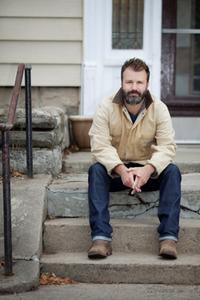 |
|
| photo: Olive Juice Studios | |
Nickolas Butler was born in Allentown, Pa., raised in Eau Claire, Wis., and educated at the University of Wisconsin and the University of Iowa Writers Workshop. Along the way he has worked as a telemarketer, a coffee roaster, a meatpacker, an innkeeper (twice), a liquor store clerk, an office manager, a hot dog vendor and an author escort. He lives on 16 acres of land in rural Wisconsin. His next-door neighbors are about 30 buffalo. Butler recently spoke with us about the upcoming Shotgun Lovesongs and his view of small-town life.
The manuscript for Shotgun Lovesongs generated so much interest, it went to auction. How did it feel to have such demand for your debut?
It was overwhelming. I'm not particularly comfortable receiving praise, and the week before the auction was incredibly intense for me. Talking to new people and just trying to process what had happened--everything moved so quickly. It was hard to comprehend that all these people in New York City had read my book and had connected to it. As a writer, you spend so much of your time alone, that to suddenly be linked to your readers in that kind of fashion was quite surreal.
You started out with an idea for a series of connected novellas.
I was incredibly impressed by Josh Weil's The New Valley. I think a lot of us at the Iowa Writer's Workshop were taken by that book. So originally I had intended to link several novellas together. Through conversations with friends and certainly my agent, I gained the confidence and patience to just keep building, keep accreting details, etc. I can't say that I ever had a concept, though. I just knew that I had some solid storylines and characters. I had a desire to write about Wisconsin, about place, friendship, love.
What does small town Wisconsin--small-town America, for that matter--mean to you?
I don't know, exactly. I suppose that around here (Eau Claire), small-town America is about producing crops or milk or beef or pork or chicken that goes out across the country and feeds people. But the people behind that work and their towns, all of that is invisible in the grander scope of things. I suppose I think of hard work and determination, determination to maintain a life-style that doesn't always make sense/cents. To commit to a place even though other places may seem sexier, more interesting. I'm not sure if that answer makes any sense or not. I think one has to be careful not to be too nostalgic for small-town America, which still has its share of problems. I think Shotgun Lovesongs is pretty fair to small-town America: some characters don't stay in Little Wing and that's a good thing, good for them. You won't find haute cuisine or a good bookstore in Little Wing, for example--two of my favorite things.
Tell us about the towns that inspired Little Wing.
There are two towns south of Eau Claire that influenced my vision of Little Wing. They don't exactly resemble Little Wing 100%, but I think their spirit does. Just these little towns that have slowly decayed yet still persist. And why? Why do they persist? Who is keeping things in place? Where does that new energy come from? I won't give you the name of those two towns. You'll have to visit Eau Claire, buy a map and start guessing.
How important is it to you that your five narrators have distinct voices?
The five narrators in the novel are joined by marriage, by lifelong friendship and by their common geography, which to my mind makes creating distinctive voices very difficult. These people should sound a bit alike. I think of married couples who finish each other sentences, or friends who don't need words to communicate. So the key is really in detail selection. A few early readers of the book wanted me to make Beth sound "more like a girl" (i.e., the use of "like", or other sort of "Valley Girl" idiom, something decidedly not-male). But I didn't think that was right. Beth and Henry should sound alike. But the truth is, Henry would not work in a salon, and Beth would. Beth is the kind of woman/person who occasionally likes to smoke cigarettes in social settings, and Henry is too cheap and too upstanding/boring for that.
Why did you decide to include a celebrity as a main character?
I think it sets up a nice dichotomy between small town and big city. Between struggling farmer and famous musician. It's another layer of tension. As a writer, you can make a celebrity-character do things that you can't make a farmer-character do, for example. You can take the narrative away from Little Wing for a while, and bring it to New York. You can give that character talents that are inspiring and different. You can give him wealth, a famous girlfriend, power.
What do you hope readers take away from Shotgun Lovesongs?
This is a very difficult question, because the reality is that readers will take away whatever they want, far apart from my hopes. But I suppose my hope is that they've just enjoyed the characters and the story. I'm incredibly thankful for their support, more than anything. Rather than hope, I'd like to say thanks. --Jaclyn Fulwood

